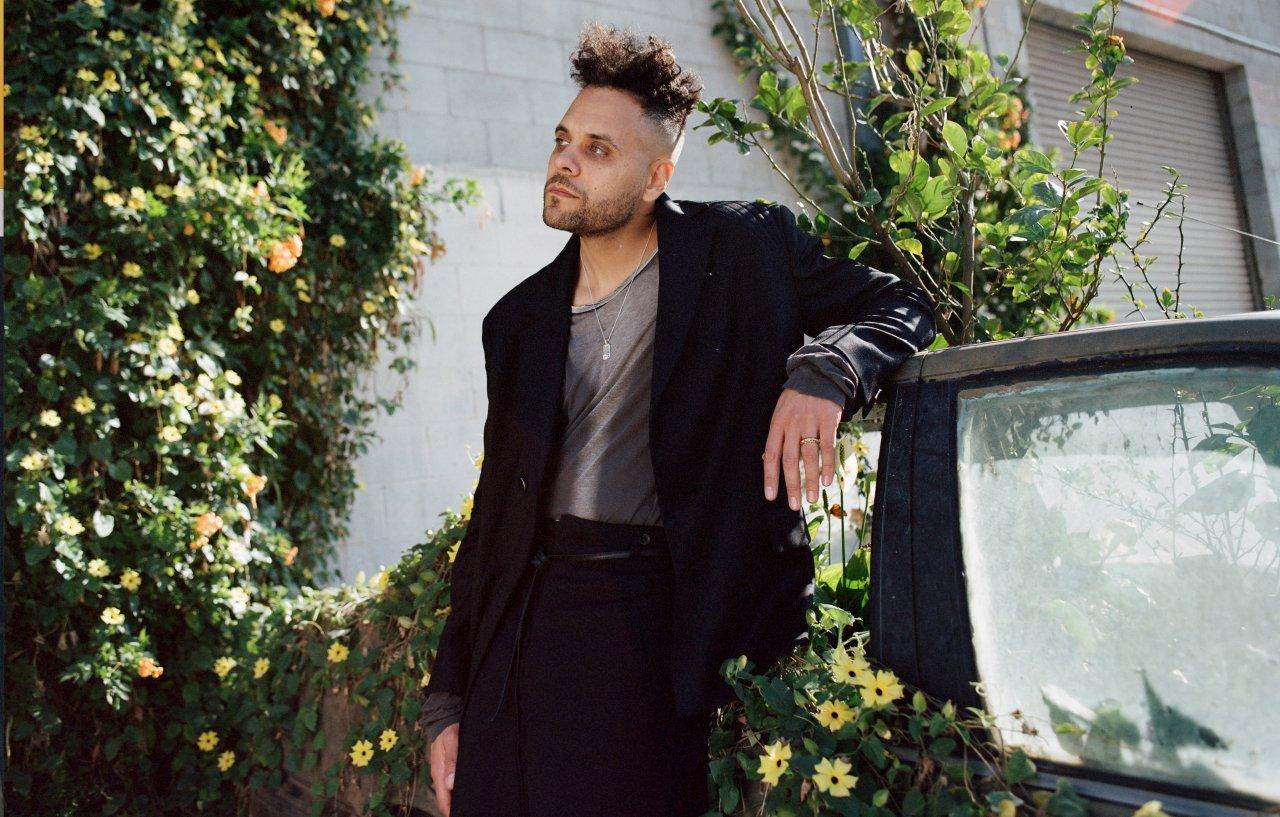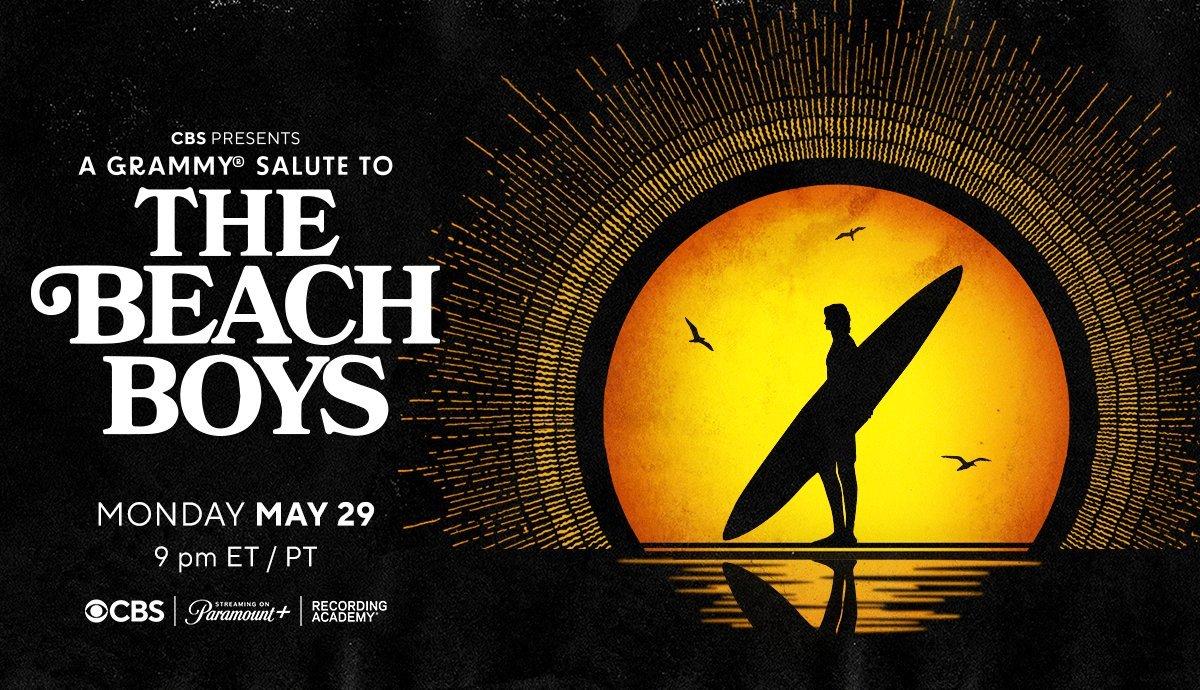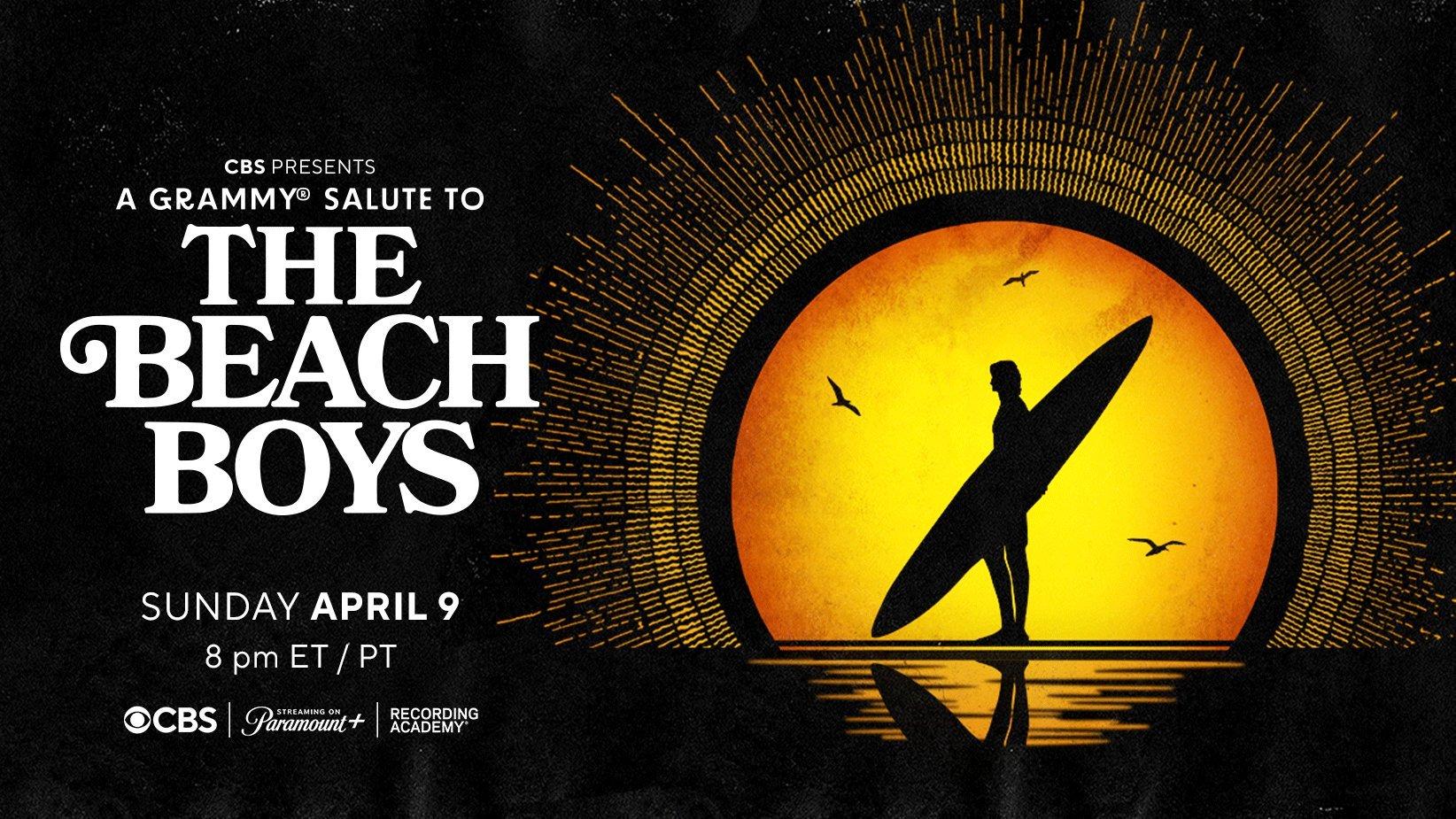Kassa Overall holds his phone aloft, and rolls his eyes back in his head.
He's playing the intro to his track "Going Up," featuring Lil B, Shabazz Palaces and Francis and the Lights, which had dropped that day. A cello drone gives way to a strange woodblock part; a chopped-up drum solo jaws at everything — then it's as if Ableton freezes. Flanked by synths and sequencers, Overall seizes in his chair, as if he's being sucked into a black hole.
"You know the part where Neo gets kicked out of the Matrix?" the GRAMMY-nominated rapper, drummer and producer tells GRAMMY.com via Zoom. "It's like that, but when you get spit out, you actually get spit out in the bush in Africa."
That 20-second intro took Overall a long time to get right, but it's one of his favorite moments on his new album, ANIMALS — which arrived May 26 on Overall's new home, Warp Records.
The conversation has turned to the concept of absurdity — a helpful lens through which to view Overall's art. It sure beats the one that hamstrung him in the past, when he did interview after interview after interview about the intersection of jazz and rap — with mental health thrown in for good measure.
"I've talked about this for two albums now," he told GRAMMY.com in 2021 with a hint of exhaustion. "I ran that cycle in my head. I'm not so much trying to prove the point anymore that these things can go together. I just want to make the dopest s—."
The joy of ANIMALS is not in that genre fusion, but Overall's swelling boldness and vividness as an artist — as well as its novel fusion of seemingly disparate collaborators. Try to find another record where you'll find jazz-adjacent pianists Vijay Iyer and Kris Davis next to singular rappers like Danny Brown and Lil B.
"The reason the jazz world feels a little bit dry and s— is because there's not really the space for absurdity," Overall says. "Somebody like Louis Armstrong or Dizzy Gillespie — a third of them was Lil B and Danny Brown energy. That's why it was fire."
On ANIMALS, Overall rose to the energetic occasion. The album is consumed with subjects like his uneasy relationship with ambition, and his relationship with his growing audience. On tracks like lead single "Ready to Ball," the Nick Hakim and Theo Croker-featuring "Make My Way Back Home," and the Vijay Iyer-assisted "The Score Was Made," Overall has bigger fish to fry — than where rap does or doesn't connect with jazz.
Read on for an interview with Overall about his latest career moves, bucking tired narratives and using collaborators as instruments — much like a certain embattled rap innovator.
This interview has been edited for clarity.
I'd like to start by talking about your pandemic-era SHADES trilogy of mixtapes. How was the experience making those mixtapes significant to your creative journey?
I was just thinking about the SHADES series yesterday, actually. I was thinking about the process of making that versus making a solo record, and I realized they're actually a lot more connected than people might think.
When I make my own music, the process of it is still sample chopping — whether I'm chopping up original music, or chopping up some Nirvana, you know what I mean? Oftentimes, my original music includes collaging from other sources.
The SHADES thing was like me going, Let me actually deal with the sample practice. I missed the idea of taking some s— and flipping it. So, that was really a lot of fun.
I think SHADES 3, the third in the trilogy, was kind of a new direction for me, because I started actually using drum machines. The series started with more of me on the laptop, locked down in COVID, chopping up this and chopping of that. For this one, I had an actual studio behind me.
The lockdown is over, so I'm not so much in the headphones. So, if you listen to SHADES 3, it's more house tracks and s— like that. For me, it was just a good experiment. Although I made beats and used sample sequences, I never really got into step sequences, and those kinds of drum machines.
I'm a novice at that; I'm brand new at that. So, that's been a lot of fun.
The last time I interviewed you, you seemed to be trying to wrestle out of the reductive narrative around your music. You're dealing with more important subjects on ANIMALS. Where are you at in your career, through the lenses of public messaging and your signing to Warp?
Thank you for pointing that out first, because that'll allow me to not have to repeat things I'm tired of repeating.
Just to recap what you're saying, historically, jazz and rap often equals corny. I've never wanted to be corny, and I don't think I've ever been corny. It just happens to be the things that I say — where I come from. It's not so much like, I'm gonna do this.
And then the mental health s— is more like, I've just gotten comfortable talking about my life. Just like with any writer — you could be a writer for years, but it could become years until you become comfortable talking about your perspective and your ideas. If I'm just talking about the things that affect me a lot, that has to be a part of it. You can't not talk about it, but it was more like, I want to get past that.
I think that putting the album out on Warp is a bit of messaging in itself, because I've been making this music that I don't consider to be that weird. My music is not weird compared to Aphex Twin or Squarepusher, you know what I mean?
It's a fresh take on electronics and organics, you know what I mean? It's unique, but it's not that weird. I came up through the industry I came up in. So, I'm trying to get booked in jazz clubs and play jazz festivals, and they're looking at me like, "Not under my banner!"
If you listen to the state of jazz, or different playlists on the various streaming platforms, they sound a lot different than when I first started putting music out. People were like, "Whoa, what is this? Is this your pop product? This is your pop album, right? How's your pop s— going?"
That's what my homies used to say — my jazz friends. "He plays good — like, he's a killing drummer, but he's also got this pop s— he do."
Your work doesn't resemble any pop music I've ever heard.
Nah, nah, But there's a drum machine of sorts. There's a clap that's not organic. There's vocals. [Laughs.] It's pop!
The first time I noticed was when I did a guest mix for BBC, which came through Tom Ravenscroft. He got hip to the album through Bandcamp; he had no idea who I am or what I am.
That's how I started even doing the SHADES stuff — when I got the opportunity to do guest mixes, I would do remixes to kind of double down. It's like a double word score of like, Yo, he's doing some extra-different s—.
So, they were like, "Producer Kassa Overall does a guest mix." And I noticed that it's the way you present something; people are listening to it differently. If I present an album as a jazz drummer, then it's some pop s— where I'm trying to sing or something.
But then when it's presented as a producer thing, people are automatically like, "Oh, word. This is, like, electronic music. It's cool. We know where to put this."
My biggest influences are unique artists — unique people who made things that are kind of their own genre, whether it be Thom Yorke, Radiohead, Björk. Even Kanye; at a point, it was rebranding the whole idea. Like, "I'm a producer — no, I'm a rapper!" "You have a gangster image!" "No, I'm wearing skinny jeans and a pink polo!"
Then, even someone like John Coltrane, somebody like Bob Marley — obviously, these are the biggest artists in their fields, but they're also people [where] whatever they're making, you didn't really know what it was before it kind of popped in.
So, I would rather people hear my music and not think it's a jazz-rap collage. What if you don't relate it to anything else? What does it sound like to you?
The thing about the last album with Brownswood [Recordings, 2020's I THINK I'M GOOD]: I was like, "Bro, so many songs I'm making that y'all are considering to be B-sides would work well next to a Frank Ocean or James Blake record."
Maybe it's a little too poppy for Brownswood's audience, but f— Brownswood's audience, you know what I mean? But there's a million people over here that don't even know what a Nord or a Rhodes is, and they f— with what I'm doing.
So I think that's the frustration I've dealt with. I'm just a dude making songs about my life. That's all it is.
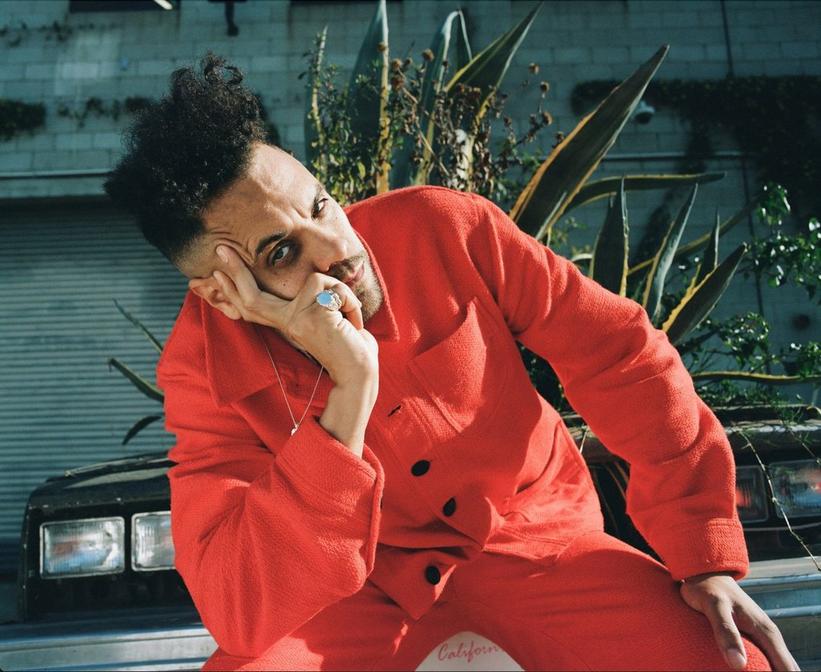
*Kassa Overall. Photo: Patrick O'Brien Smith*
Was it a difficult process to find a post-Brownswood home that was conducive to what you want to do?
No, it was very easy. And shouts to Brownswood; I'm not saying "F— Brownswood." That's the homies. [Label founder] Gilles Peterson is still a big supporter of what I'm doing. I'm just saying moreso my image and branding — if you want to make it seem like I'm this organic Afro-bop type, it's not gonna really sell. My s— is way too sad boy.
Somebody from Warp hit me up after I THINK I'M GOOD came out and asked me to make some beats for Danny Brown. Actually, they asked me if I had some beats. I was like, "Bro, give me two weeks," and I made three beats for Danny Brown; he picked two of them.
And then, that same A&R came back around and was like, "Yo, I think you should touch some other tracks on the album and 'Kass out' the whole album." So, I added all sorts of little drums and vocal throws — different things to give my little texture.
I ended up working on four joints total on Danny's next record — and fully producing one, which is one of the singles, but it sounds like a Kass kind of thing. So, that relationship started, and we chop it up on music stuff regularly.
When I started getting ready to shop for my next record, it was kind of like, "Y'all want to do it?" and [Warp] was like "Hell yeah."
I could have signed somewhere else and gotten more money, but the branding would be the same "What is this?" type of thing. I think Warp has the history of electronic music, and they have artists there now — it tells a story of what I'm doing, in a good way. I fit into the thing.
You came up in the jazz scene, and your relationship with ambition weighs heavily on ANIMALS. What is it about that world that lends itself to a hyper-competitive, rise-and-grind spirit?
I think it's the displacement of a cultural home. I understand what you're talking about — jazz, self-help, motivational. There's so many connector cables there, and I'm guilty of it all.
As a jazz musician, you have to learn how to practice. Like, I'm gonna practice all day, and the gigs are gonna come, and you're damn near doing, like, affirmations, and then you go sit in at Smalls. It's not like a doctor goes to school, and then applies, and it's an actual, visible track, The music thing is very pie-in-the-sky.
If you think about self-help as its own branding and industry, a lot of jazz musicians are susceptible to that kind of rhetoric. Because it's like, this person is huge, this person has nothing, and they're almost equally talented. One of them grinds his ass off; the other one drinks.
The other thing — this might be a little darker, a shadow thing — is one thing that happened with jazz is colleges. Once jazz became this academia thing, that's the student industry. That means you have jazz musicians turning to students as a means of sustainment.
That's not really the culture of the music. The music isn't really rise-and-grind. The culture is not even about success. People like Jimmy Heath expressed this to me: it wasn't popular.
It's popular now, or it looks like it. A Love Supreme is this huge thing, right? But if you listen to Elvin Jones interviews and stuff, he talks about playing in these clubs, and there's, like, six people there. Four of them are waiters, and people were not trying to hear that noise.
The idea is that you're going to choose this music that's not really designed for mass appeal, but the motivation is mass appeal. It's kind of a conflicting direction. That's not to say it can't work; there's a lot of people making it work.
But we're all screwed a little bit. It might not just be a jazz musician thing, and it might not just be a musician thing, but we're all kind of in this place of Work, work, work, work, work, work, work, work, and who works the most wins.
I don't want to live like that, and I find myself in that position at times. I'm going like, Something's got to give eventually. It's supposed to be more of a spiritual thing — a practice.
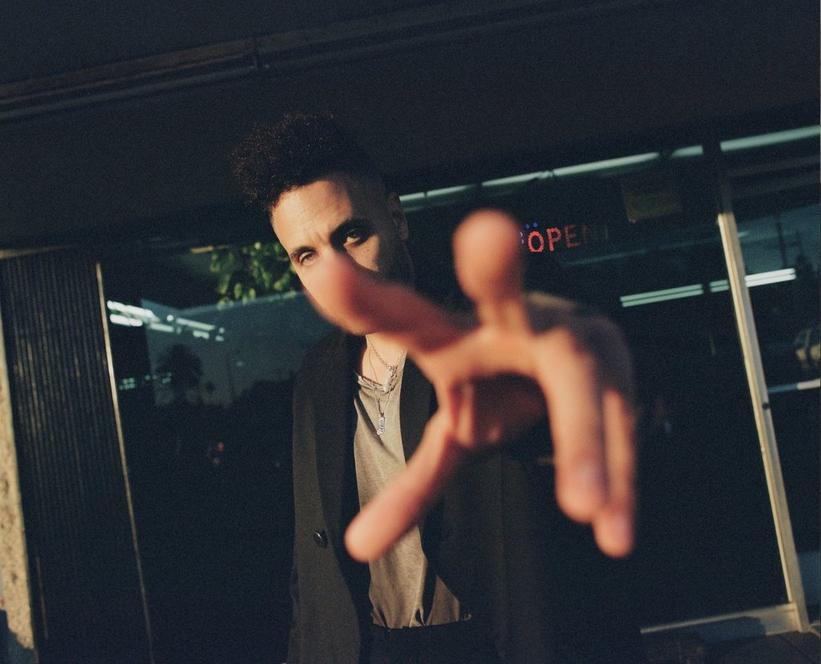
*Kassa Overall. Photo: Patrick O'Brien Smith*
You mentioned Kanye; I love the way he seemed to use collaborators as instruments on Donda. I get that same feeling from ANIMALS.
It's funny you say this. When I started working on this record — we're talking about 2019, even, some of these joints — I always pick a couple of albums to compete with. That's kind of one of my secrets. The last record was [Snoop Dogg's] Doggystyle and [2Pac's] All Eyez on Me. And this record was Dark Twisted Fantasy.
I haven't said this much in interviews, because I don't want to be like, "Kassa Overall drops album dedicated to Kanye!" [Laughs hard] But he was a huge influence on my process.
You have these long-ass songs. It's an open-ended beat. And however many minutes [into Dark Twisted Fantasy], Rick Ross comes in. Or you have Paul McCartney working on the melody. That was the inspiration behind this. If you listen close to a lot of the sonics, you'll hear, Oh, this is in conversation with that production process.
A musician like Kris Davis, for example. An absolute weirdo. You sit down and talk with her — so stoic. Who she is in itself is an anomaly. And then the music she makes is so unique.
Somebody like her would never cross paths with Danny Brown, who's equally strange. Even just his voice; he was a weirdo in his world. He was signed to G-Unit. He came up in Detroit, street rap adjacent, but when he popped off by kind of busting out of that and embracing more of the weirdo myths of his art. He's a standout in his own space.
I look at those two artists as people that actually have more in common than you would think. They're similar because they're very different in their own spaces. I think the world that Danny Brown lives in is better with Kris Davis in it. And I think the world that Kris Davis and Vijay Iyer are in is better with Lil B in it.
10 Emerging Jazz Artists To Watch: Simon Moullier, Mali Obomsawin, Julieta Eugenio, Jeremy Dutton & More


